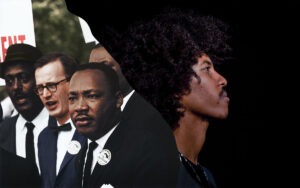
February 6, 2020; The New Yorker
In a highly personal and introspective piece of writing, David Remnick, the editor of the New Yorker, reflected on the meaning of President Donald Trump’s awarding the Medal of Freedom to Rush Limbaugh at the State of the Union speech this past week.
Remnick was both troubled by, and yet seemed to understand, the message being conveyed by this very deliberate act. He writes, “Limbaugh is 69 and, as he just announced on his daily radio program, has been diagnosed with late-stage lung cancer. Empathy is due to anyone who is suffering. But not high honors.”
Many were aghast that an award of this magnitude, whose previous recipients include such civil and human rights icons as the Rev. Martin Luther King, John Lewis, Rosa Parks, and Nelson Mandela, was being given to a man known to be a racist, anti-Semite, and proud bigot. That the president chose to time this award when he would have a very large and very public audience was also not lost on Remnick—or others.
Remnick reflected on his time in 1986 when he traveled with and reported on Lee Atwater, a political consultant whose credentials and reputation in those times aligned with Limbaugh’s today. Atwater was largely responsible for the “Willie Horton” ad campaign that sought to persuade voters that Michael Dukakis, the Democratic candidate for president, was soft on crime. He was able to make perception reality, helping sink the Dukakis campaign. Remnick saw the parallels between Atwater and how Limbaugh operates and uses his connections and his audiences.
Sign up for our free newsletters
Subscribe to NPQ's newsletters to have our top stories delivered directly to your inbox.
By signing up, you agree to our privacy policy and terms of use, and to receive messages from NPQ and our partners.
“As I watched Rush Limbaugh receive the Medal of Freedom from Donald Trump during the State of the Union grotesqueries on Tuesday night, it was hard not to think of Lee Atwater, the continuing tradition of race-baiting, and how it infects our debased politics,” Remnick wrote.
There is hardly a group of people that Limbaugh has not demeaned, notes Remnick. From Black people to women’s groups, from immigrants to the disabled community, Limbaugh, via radio and television, has vilified them all. According to Remnick, he has played a unique role in the radicalization of the Republican party and in building the conservative movement. All of this has led to the centrality of his position today with the right wing.
“Most leading conservatives have overlooked Limbaugh’s racist trespasses in order to curry his favor,” Remnick writes. “His scorn, and the scorn of his most loyal fans, carried a high political price.”
And yet, on occasion, President Trump does seek out Black faces to elevate to show the public his “lack of bias.” He did this through a Super Bowl commercial featuring Alice Marie Johnson, a Black woman who was serving a life sentence for a nonviolent drug conviction. She was freed in 2018 when Trump commuted her sentence after an appeal from Kim Kardashian West. Allegedly, Trump himself made suggestions about the ad, which was seen by over 100 million viewers. Such a gesture, along with shout-outs at the State of the Union address to Black Americans, such as Tuskegee airman Charles McGee, serve as a kind of counterbalance to actions Trump takes to solidify his base, such as granting the Medal of Freedom to Rush Limbaugh.
As Remnick observes, the medal was a message from Trump to solidify his base and prepare for the upcoming election. Limbaugh was there, as Remnick aptly puts it, as an “instrument of his campaign to retain the powers of the presidency.”—Carole Levine













